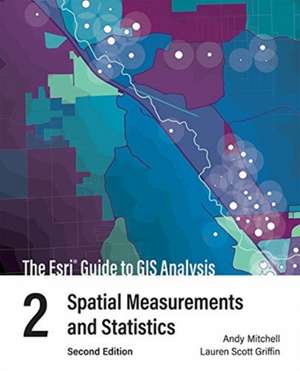Esri Guide to GIS Analysis, Volume 2
Autor Lauren Scott Griffinen Limba Engleză Paperback – 20 ian 2021
Learn how to get better answers in map analysis when you use spatial measurements and statistics.
Spatial measurements and statistics give you a powerful way to analyze geospatial data, but you don't need to understand complex mathematical theories to apply statistical tools and get meaningful results in your projects.
The Esri Guide to GIS Analysis, Volume 2: Spatial Measurements and Statistics, second edition, builds on Volume 1 by taking you to the next step of GIS analysis. This book introduces readers to basic statistical concepts and some of the most common spatial statistics tasks: measuring distributions, identifying patterns and clusters, and analyzing relationships. Explore how spatial statistical tools can be applied in a range of disciplines, from public health to habitat conservation. Learn how to quantify patterns beyond visualizing them in maps. Examine spatial clusters through an updated chapter on identifying clusters.
UseThe Esri Guide to GIS Analysis, Volume2, second edition, to understand the statistical methods and tools that can move your work past mapping and visualization to more quantitative statistical assessment.
Preț: 391.28 lei
Nou
74.88€ • 77.70$ • 62.59£
Carte disponibilă
Livrare economică 24 februarie-10 martie
Specificații
ISBN-10: 1589486080
Pagini: 250
Dimensiuni: 191 x 235 x 19 mm
Greutate: 0.66 kg
Editura: Esri Press
Notă biografică
Cuprins
Foreword to the second edition
Foreword to the first edition
Acknowledgments
Chapter 1: Introducing spatial measurements and statistics
Understanding Data Distributions
Chapter 2: Measuring geographic distributions
Testing statistical significance
Chapter 3: Identifying patterns
Defining spatial neighborhoods and weights
Chapter 4: Using statistics with geographic data
Using statistics with geographic data
Chapter 5: Analyzing geographic relationships
Data credits
Index














